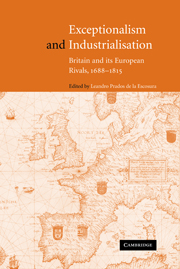Book contents
- Frontmatter
- Contents
- List of tables and figures
- List of contributors
- Acknowledgements
- Introduction: Was British industrialisation exceptional?
- Part I The origins of British primacy
- Part II Agriculture and industrialisation
- Part III Technological change
- Part IV Institutions and growth
- 8 The monetary, financial and political architecture of Europe, 1648–1815
- 9 Towards the comparative fiscal history of Britain and France during the ‘long’ eighteenth century
- 10 Money and economic development in eighteenth-century England
- Part V War and Hegemony
- Conclusions
- References
- Index
9 - Towards the comparative fiscal history of Britain and France during the ‘long’ eighteenth century
Published online by Cambridge University Press: 04 December 2009
- Frontmatter
- Contents
- List of tables and figures
- List of contributors
- Acknowledgements
- Introduction: Was British industrialisation exceptional?
- Part I The origins of British primacy
- Part II Agriculture and industrialisation
- Part III Technological change
- Part IV Institutions and growth
- 8 The monetary, financial and political architecture of Europe, 1648–1815
- 9 Towards the comparative fiscal history of Britain and France during the ‘long’ eighteenth century
- 10 Money and economic development in eighteenth-century England
- Part V War and Hegemony
- Conclusions
- References
- Index
Summary
In his recent, globally expansive mode at Oslo, Patrick O'Brien comments that ‘during an “imperial meridian” (1783–1815), European naval and military superiority over the states and societies of other continents emerged as virtually irresistible’. ‘Europeans emerged from that conjuncture in their history’, he states, ‘with massive additions to the populations, territories and natural resources of other continents under their direct or informal control.’ In this account of global history, the word ‘fiscal’, let alone the term ‘fiscal history’, does not occur. Yet if the great work on war and public finance in Britain between 1793 and 1815 has never appeared in book form, Patrick O'Brien has devoted much of his career to such issues, and the term ‘fiscal crisis’ appears elsewhere in his writings. Of Britain's experience in the eighteenth century, he writes (with Philip Hunt), that ‘although politicians worried about it, the national debt went up and up without leading to fiscal crises of the kind that led to changes of regime in France and elsewhere on the Continent’. Historians, he adds, ‘have recognized the obvious relationship between the power of states and the fiscal means at their disposal but they are also aware that the connections were never unitary or simple’.
For Patrick O'Brien, two basic trends in British fiscal history stand out with clarity. The first is that between 1665 and 1790, ‘a period when the kingdom's population and economic base potentially available for taxation remained relatively small compared to France, Russia, the Habsburg Empire and Spain, the amount of taxes which poured into the Exchequer in London multiplied sevenfold in real terms and increased as a share of national income nearly four times’.
- Type
- Chapter
- Information
- Exceptionalism and IndustrialisationBritain and its European Rivals, 1688–1815, pp. 191 - 215Publisher: Cambridge University PressPrint publication year: 2004



